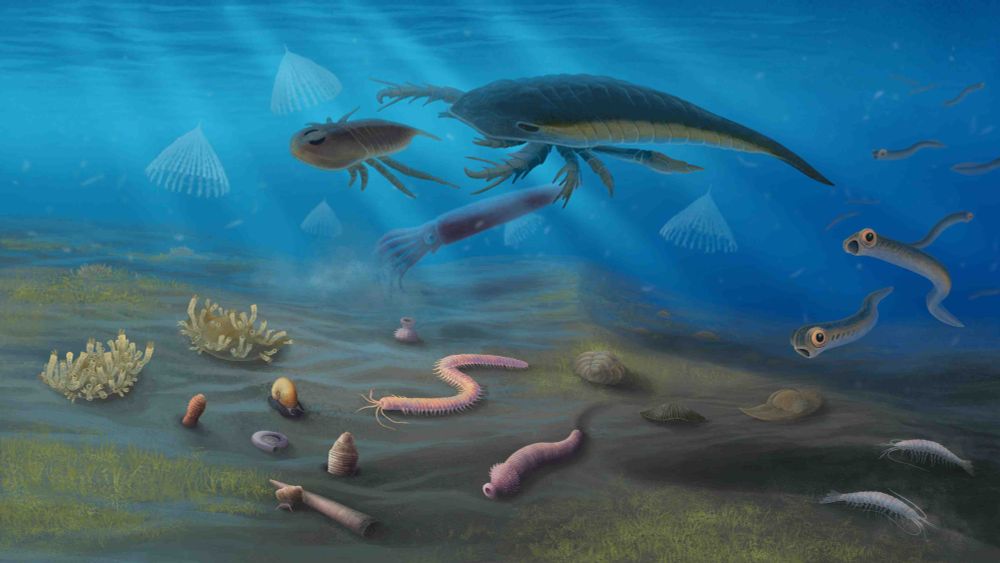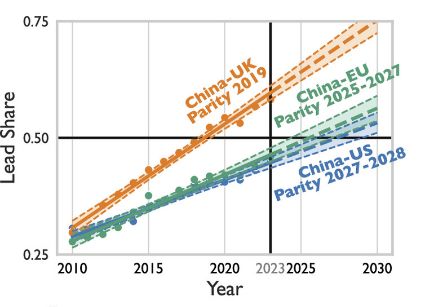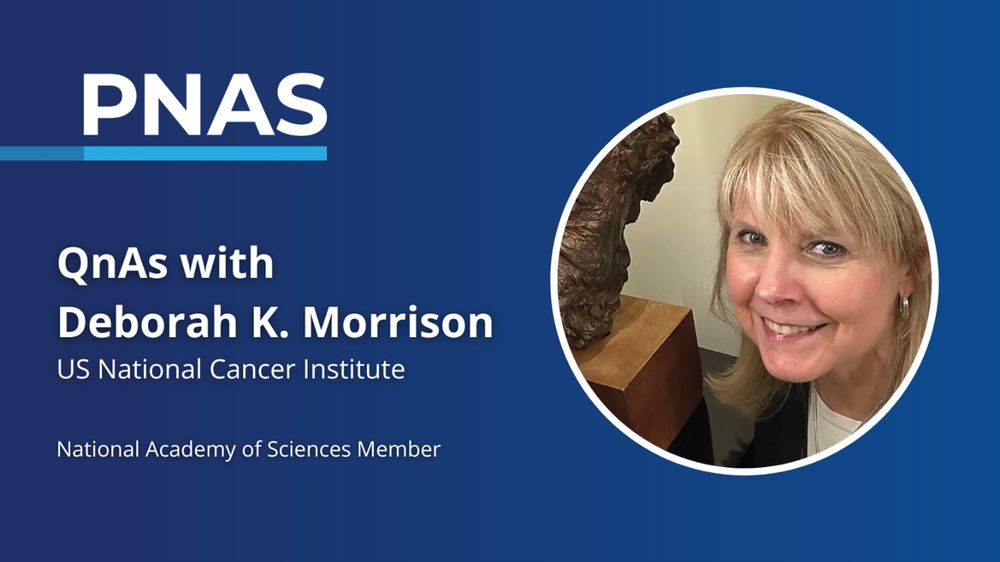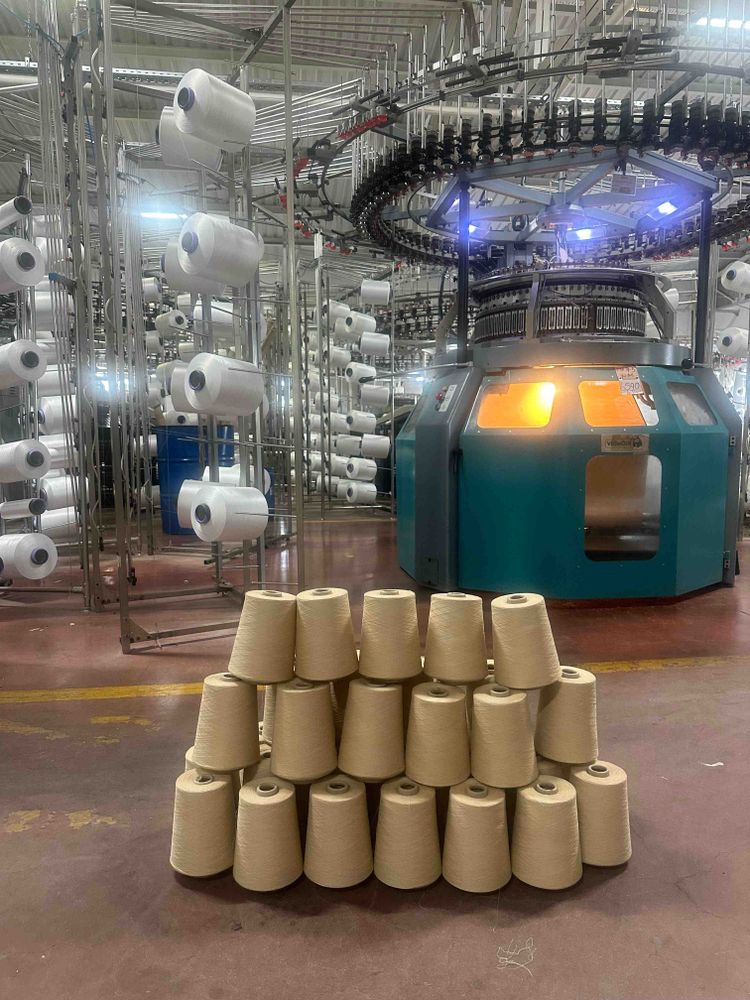
Proceedings of the National Academy of Sciences
@pnas.org
Explore groundbreaking news and research from PNAS, one of the world's most-cited scientific journals. Discover its sibling journal, @pnasnexus.org, both official journals of the National Academy of Sciences. Visit www.pnas.org for more info.
Well-preserved marine fossils from North Dakota are a treasure trove of data on life in the Ordovician Period, and they suggest that previously documented Ordovician deposits from marginal habitats may not be representative of the period. In PNAS: https://ow.ly/wbpX50XpuS9

November 11, 2025 at 12:00 AM
Well-preserved marine fossils from North Dakota are a treasure trove of data on life in the Ordovician Period, and they suggest that previously documented Ordovician deposits from marginal habitats may not be representative of the period. In PNAS: https://ow.ly/wbpX50XpuS9
Satellite data show both hemispheres reflect less sunlight—but the Northern Hemisphere is darkening faster. The finding challenges Earth’s natural albedo balance and raises key climate questions.
In Smithsonian Magazine: https://ow.ly/vGV750XpsR9
In PNAS: https://ow.ly/jO4K50XpsA6
In Smithsonian Magazine: https://ow.ly/vGV750XpsR9
In PNAS: https://ow.ly/jO4K50XpsA6

November 10, 2025 at 10:00 PM
Satellite data show both hemispheres reflect less sunlight—but the Northern Hemisphere is darkening faster. The finding challenges Earth’s natural albedo balance and raises key climate questions.
In Smithsonian Magazine: https://ow.ly/vGV750XpsR9
In PNAS: https://ow.ly/jO4K50XpsA6
In Smithsonian Magazine: https://ow.ly/vGV750XpsR9
In PNAS: https://ow.ly/jO4K50XpsA6
Analysis of nearly 6 million scientific publications shows that Chinese institutions now lead 45% of US-China collaborative research teams, up from 30% in 2010, signaling shifting power dynamics in international scientific collaboration. In PNAS: https://ow.ly/Itpx50XpuBb

November 10, 2025 at 8:01 PM
Analysis of nearly 6 million scientific publications shows that Chinese institutions now lead 45% of US-China collaborative research teams, up from 30% in 2010, signaling shifting power dynamics in international scientific collaboration. In PNAS: https://ow.ly/Itpx50XpuBb
Inspired by the inner workings of the #HumanBrain, #NeuromorphicComputing could potentially help reduce AI’s high #energy costs. A PNAS Core Concept explainer: https://ow.ly/e9W150Xpsbv
#AI #ArtificialIntelligence #LLMs #ChatGPT #NeuralNetwork #DataCenter
#AI #ArtificialIntelligence #LLMs #ChatGPT #NeuralNetwork #DataCenter

November 10, 2025 at 6:01 PM
Inspired by the inner workings of the #HumanBrain, #NeuromorphicComputing could potentially help reduce AI’s high #energy costs. A PNAS Core Concept explainer: https://ow.ly/e9W150Xpsbv
#AI #ArtificialIntelligence #LLMs #ChatGPT #NeuralNetwork #DataCenter
#AI #ArtificialIntelligence #LLMs #ChatGPT #NeuralNetwork #DataCenter
Read highlights in this week’s issue of PNAS: We explore the role of inflammasomes in periodontitis, analyze rare meteorite fragments on the Moon, and examine regional deforestation and global biogeochemical cycles. In PNAS: https://ow.ly/sxEk50XprLK

November 10, 2025 at 4:01 PM
Read highlights in this week’s issue of PNAS: We explore the role of inflammasomes in periodontitis, analyze rare meteorite fragments on the Moon, and examine regional deforestation and global biogeochemical cycles. In PNAS: https://ow.ly/sxEk50XprLK
Bigger, hotter fires mean more toxic #smoke. Recent blazes are releasing dangerous #pollutants as they burn the #BuiltEnvironment. Read this PNAS Inner Workings piece: https://ow.ly/QMzX50Xotoc
#plastics #VOCs #AirPollution #ClimateChange #benzene #acetone
#plastics #VOCs #AirPollution #ClimateChange #benzene #acetone

November 8, 2025 at 6:00 PM
Bigger, hotter fires mean more toxic #smoke. Recent blazes are releasing dangerous #pollutants as they burn the #BuiltEnvironment. Read this PNAS Inner Workings piece: https://ow.ly/QMzX50Xotoc
#plastics #VOCs #AirPollution #ClimateChange #benzene #acetone
#plastics #VOCs #AirPollution #ClimateChange #benzene #acetone
How do #networks connect people, cities & technology? 🌐
Explore the Human, Urban & Technological Networks Collection in PNAS Nexus—research across #biology, #engineering & #socialsciences revealing how #connectivity shapes our world: https://ow.ly/JLPY50Xoqxk
#Science #Research
Explore the Human, Urban & Technological Networks Collection in PNAS Nexus—research across #biology, #engineering & #socialsciences revealing how #connectivity shapes our world: https://ow.ly/JLPY50Xoqxk
#Science #Research

November 8, 2025 at 4:00 PM
How do #networks connect people, cities & technology? 🌐
Explore the Human, Urban & Technological Networks Collection in PNAS Nexus—research across #biology, #engineering & #socialsciences revealing how #connectivity shapes our world: https://ow.ly/JLPY50Xoqxk
#Science #Research
Explore the Human, Urban & Technological Networks Collection in PNAS Nexus—research across #biology, #engineering & #socialsciences revealing how #connectivity shapes our world: https://ow.ly/JLPY50Xoqxk
#Science #Research
A thin magma ocean above Earth's core could only have generated the planet's magnetic field if the magma was far more electrically conductive than estimated, suggesting that another mechanism is needed to explain early Earth's magnetic field. In PNAS: https://ow.ly/Xv0150XoufQ

November 8, 2025 at 12:00 AM
A thin magma ocean above Earth's core could only have generated the planet's magnetic field if the magma was far more electrically conductive than estimated, suggesting that another mechanism is needed to explain early Earth's magnetic field. In PNAS: https://ow.ly/Xv0150XoufQ
In a recent PNAS QnAs, molecular biologist Deborah K. Morrison discusses her career-long investigation of RAF kinases and shares new insights into how the cancer-linked enzyme BRAF is activated—findings that could inform targeted therapies. Read more: https://ow.ly/MffM50XoqUk

November 7, 2025 at 10:00 PM
In a recent PNAS QnAs, molecular biologist Deborah K. Morrison discusses her career-long investigation of RAF kinases and shares new insights into how the cancer-linked enzyme BRAF is activated—findings that could inform targeted therapies. Read more: https://ow.ly/MffM50XoqUk
An investigation into representations formed by LLMs during inference tasks concludes that human-like conceptual representations can emerge purely from language prediction without real-world grounding. In PNAS: https://ow.ly/vFfL50XotMQ

November 7, 2025 at 8:00 PM
An investigation into representations formed by LLMs during inference tasks concludes that human-like conceptual representations can emerge purely from language prediction without real-world grounding. In PNAS: https://ow.ly/vFfL50XotMQ
A slick #math trick offers a new way to return a rotated object to its original state. In PNAS Journal Club: https://ow.ly/7ZKR50Xotjb
#MathematicalModel #QuantumComputer #QuantumMechanics #RandomWalk
#MathematicalModel #QuantumComputer #QuantumMechanics #RandomWalk

November 7, 2025 at 6:01 PM
A slick #math trick offers a new way to return a rotated object to its original state. In PNAS Journal Club: https://ow.ly/7ZKR50Xotjb
#MathematicalModel #QuantumComputer #QuantumMechanics #RandomWalk
#MathematicalModel #QuantumComputer #QuantumMechanics #RandomWalk
Fermentable fashion: your next pair of jeans or cozy socks could be made of protein derived from yeast, a sustainable alternative to synthetic fabrics that could reduce plastic pollution and free up land and water for growing food. In PNAS: https://ow.ly/ZFxL50Xou93

November 7, 2025 at 5:02 PM
Fermentable fashion: your next pair of jeans or cozy socks could be made of protein derived from yeast, a sustainable alternative to synthetic fabrics that could reduce plastic pollution and free up land and water for growing food. In PNAS: https://ow.ly/ZFxL50Xou93
Never miss a discovery.
Get the latest open access research from PNAS Nexus. Sign up for email alerts and get notified as new articles publish: https://ow.ly/saze50XopBx
Get the latest open access research from PNAS Nexus. Sign up for email alerts and get notified as new articles publish: https://ow.ly/saze50XopBx

November 7, 2025 at 4:01 PM
Never miss a discovery.
Get the latest open access research from PNAS Nexus. Sign up for email alerts and get notified as new articles publish: https://ow.ly/saze50XopBx
Get the latest open access research from PNAS Nexus. Sign up for email alerts and get notified as new articles publish: https://ow.ly/saze50XopBx
Antarctic ice cores preserve air up to 6 million years old, dated by their deficit in Argon-40. The air captures a record of progressive cooling over the Pliocene. Even older basal ice may date from the adolescence of the Antarctic ice sheet. In PNAS: https://ow.ly/s3fU50XnO0K

November 7, 2025 at 12:00 AM
Antarctic ice cores preserve air up to 6 million years old, dated by their deficit in Argon-40. The air captures a record of progressive cooling over the Pliocene. Even older basal ice may date from the adolescence of the Antarctic ice sheet. In PNAS: https://ow.ly/s3fU50XnO0K
One of the most-viewed PNAS articles in the last week is “Engineered 3D immuno-glial-neurovascular human miBrain model.” Explore the article here: https://ow.ly/B5ho50XnNGa
For more trending articles, visit https://ow.ly/2k2o50XnNGg.
For more trending articles, visit https://ow.ly/2k2o50XnNGg.

November 6, 2025 at 10:00 PM
One of the most-viewed PNAS articles in the last week is “Engineered 3D immuno-glial-neurovascular human miBrain model.” Explore the article here: https://ow.ly/B5ho50XnNGa
For more trending articles, visit https://ow.ly/2k2o50XnNGg.
For more trending articles, visit https://ow.ly/2k2o50XnNGg.
Is it possible that social media, which promised to connect the world, instead increased polarization? A model of human social dynamics predicts a sharp transition into a polarized state above a certain threshold of social connectivity. In PNAS: https://ow.ly/Gym350XnNW8

November 6, 2025 at 8:01 PM
Is it possible that social media, which promised to connect the world, instead increased polarization? A model of human social dynamics predicts a sharp transition into a polarized state above a certain threshold of social connectivity. In PNAS: https://ow.ly/Gym350XnNW8
Opinion piece: How gene drives and species complexes pose real risks of collateral damage. In PNAS Front Matter: https://ow.ly/UPH750XnNxh
#GeneDrive #TargetSpeciesComplex #RiskAssessment #PublicHealth #agriculture #malaria #mosquitoes #vector #AnophelesGambiae
#GeneDrive #TargetSpeciesComplex #RiskAssessment #PublicHealth #agriculture #malaria #mosquitoes #vector #AnophelesGambiae

November 6, 2025 at 6:01 PM
Opinion piece: How gene drives and species complexes pose real risks of collateral damage. In PNAS Front Matter: https://ow.ly/UPH750XnNxh
#GeneDrive #TargetSpeciesComplex #RiskAssessment #PublicHealth #agriculture #malaria #mosquitoes #vector #AnophelesGambiae
#GeneDrive #TargetSpeciesComplex #RiskAssessment #PublicHealth #agriculture #malaria #mosquitoes #vector #AnophelesGambiae
Vaccine development is in its nanotechnology era. A new Perspective, part of a Special Feature with 14 papers, explores how nanotherapeutic design and modification are enabling rapid, personalized, and powerful vaccine strategies In PNAS: https://ow.ly/3ijJ50XnOjy

November 6, 2025 at 5:02 PM
Vaccine development is in its nanotechnology era. A new Perspective, part of a Special Feature with 14 papers, explores how nanotherapeutic design and modification are enabling rapid, personalized, and powerful vaccine strategies In PNAS: https://ow.ly/3ijJ50XnOjy
In this issue: Neighboring cells in fat tissue lend a hand when critical genes stop working, regional deforestation impacts and global biogeochemical cycles, and the chronology of the Early Triassic Period is refined. In PNAS: https://ow.ly/vMAu50XnNlt

November 6, 2025 at 4:01 PM
In this issue: Neighboring cells in fat tissue lend a hand when critical genes stop working, regional deforestation impacts and global biogeochemical cycles, and the chronology of the Early Triassic Period is refined. In PNAS: https://ow.ly/vMAu50XnNlt
Deforestation and soil erosion following wildfires altered carbon and sulfur cycles during the Permian-Triassic mass extinction, but not until several hundred thousand years after the volcanic events that kicked off the extinction event. In PNAS: https://ow.ly/YfcE50XmLFm

November 5, 2025 at 12:00 AM
Deforestation and soil erosion following wildfires altered carbon and sulfur cycles during the Permian-Triassic mass extinction, but not until several hundred thousand years after the volcanic events that kicked off the extinction event. In PNAS: https://ow.ly/YfcE50XmLFm
Ancient ash beds in South China are dated through U-Pb zircon isotope ratios and Bayesian eruption age modeling. The resulting model provides a framework to evaluate the tempo of biotic evolution after the Permian–Triassic mass extinction. In PNAS: https://ow.ly/Rw7n50XmLAg

November 4, 2025 at 8:30 PM
Ancient ash beds in South China are dated through U-Pb zircon isotope ratios and Bayesian eruption age modeling. The resulting model provides a framework to evaluate the tempo of biotic evolution after the Permian–Triassic mass extinction. In PNAS: https://ow.ly/Rw7n50XmLAg
One of the most-viewed PNAS articles in the last week is “Engineered 3D immuno-glial-neurovascular human miBrain model.” Explore the article here: https://ow.ly/q1U350XmIwf
For more trending articles, visit https://ow.ly/sweo50XmIw6.
For more trending articles, visit https://ow.ly/sweo50XmIw6.

November 4, 2025 at 7:31 PM
One of the most-viewed PNAS articles in the last week is “Engineered 3D immuno-glial-neurovascular human miBrain model.” Explore the article here: https://ow.ly/q1U350XmIwf
For more trending articles, visit https://ow.ly/sweo50XmIw6.
For more trending articles, visit https://ow.ly/sweo50XmIw6.
Soft corals switch between flexible and rigid states by jamming together or pulling apart branched skeletal structures suspended in gel. A study explores the shapes of the structures, called sclerites, with implications for soft robotics. In PNAS: https://ow.ly/rRgI50XlMmA

November 4, 2025 at 12:00 AM
Soft corals switch between flexible and rigid states by jamming together or pulling apart branched skeletal structures suspended in gel. A study explores the shapes of the structures, called sclerites, with implications for soft robotics. In PNAS: https://ow.ly/rRgI50XlMmA
Nonpolar hydrocarbons like methane and ethane can mix with polar hydrogen cyanide in solid form—defying “like dissolves like.” This finding sheds light on Titan’s icy chemistry and geological evolution.
In Space.com: https://ow.ly/QBE550XlKE9
In PNAS: https://ow.ly/PXvW50XlKEl
In Space.com: https://ow.ly/QBE550XlKE9
In PNAS: https://ow.ly/PXvW50XlKEl

November 3, 2025 at 10:00 PM
Nonpolar hydrocarbons like methane and ethane can mix with polar hydrogen cyanide in solid form—defying “like dissolves like.” This finding sheds light on Titan’s icy chemistry and geological evolution.
In Space.com: https://ow.ly/QBE550XlKE9
In PNAS: https://ow.ly/PXvW50XlKEl
In Space.com: https://ow.ly/QBE550XlKE9
In PNAS: https://ow.ly/PXvW50XlKEl
The Indonesian island of Sulawesi was formed 1–3 million years ago when six islands that had been separated for up to 25 million years fused. When populations of sun skinks met again, some hybridized but others coexisted as separate species. In PNAS: https://ow.ly/QnoL50XlMsM

November 3, 2025 at 8:00 PM
The Indonesian island of Sulawesi was formed 1–3 million years ago when six islands that had been separated for up to 25 million years fused. When populations of sun skinks met again, some hybridized but others coexisted as separate species. In PNAS: https://ow.ly/QnoL50XlMsM

